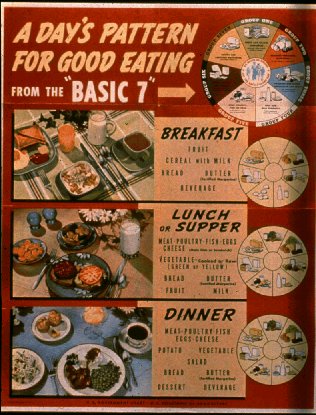
I grew up learning that we should be eating 3 ‘square’ meals per day. I remember being taught in Home Economics class (6th grade) that a square meal consisted of Meat, Vegetables, Dairy, and Grain. So basically, a cheeseburger could be considered a ‘square meal’; it contains meat, lettuce & tomato make up the veg, cheese would check the dairy box, and the bun is a grain.
Huh.
As I entered my 30s, we started to get a little more sophisticated with our food. The low-fat craze was in full blown effect, vegetarianism was becoming more mainstream, and the new advice was to eat 6 smaller meals per day – so that you could keep your metabolism ‘revved up’ throughout the day. The thinking was that if you ate often enough, you could use the Thermic Effect of Food to help you burn calories for you (although that’s true, it doesn’t quite work that way).
For years, while I was in my bodybuilding phase, I ate 6 smaller meals per day, and always had a hard time adhering to that way of eating. I preferred to sit down to eat a larger meal, and so it was difficult for me to reduce my calories enough at each meal to create a deficit. I’d end up eating a few slices of turkey & a handful of grape tomatoes. It seemed sad. Grazing wasn’t a style of eating that suited me.
When I decided that the bodybuilding lifestyle wasn’t for me, I started to relax on my eating to determine where I naturally fell. And I found after a while that I naturally fell into a 4 meals a day routine.
One of the problems with the 3 meals per day model is that typically folks eat lunch at 12:00 noon, and then dinner around 7:00 (some even later). So, that’s a pretty significant time delay between meals – which can easily lead to overeating in the evening.
Thats why 4 meals works best for me.
Today, a technique called Intermittent Fasting has been gaining popularity. There are different ways to do it (fasting for 14 hours, or for a whole day at a time). I’ve tried intermittent fasting, and it didn’t work great for me. I felt deprived, and if I got too hungry, I’d eat everything in sight. Intermittent fasting tends to work best for 1) men, 2) under the age of 35, 3) who are ectomorphs (folks who have a hard time gaining fat or muscle, they can eat pretty much anything they want, do well on vegetarian diets, and ‘forget’ to eat. <- I don’t know who forgets to eat, but apparently there are folks out there who do. O.o)
I don’t fit into any of those categories, so its really no surprise that intermittent fasting didn’t work for me.
Here are a few resources if you’re interested in learning more about Intermittent Fasting:
I think what all of this illustrates, is that like diets and meal plans, there are lots of different methods. In addition to what you eat, there are different ways of timing your meals and calories too.
What is most important is that you find a method that works well for you: your lifestyle, how you like to eat, and the social aspect of eating. Additionally, your daily calorie intake is most important if you are trying to maintain, lose or gain weight.
And the biggest factor in fullness, energy levels and physique goals is the quality of the foods that you do eat.
***
If you like what you’re reading, join my inner circle and get access to my best stuff. Stuff that’s even better than this! I know. Can you believe that there’s more? If you’re not on the list, sign up HERE to get more tips, tools, and ideas delivered weekly to your inbox.
You’ll learn how to change your relationship with food, your body, and realize that what you eat doesn’t determine whether or not you are a good/bad person.